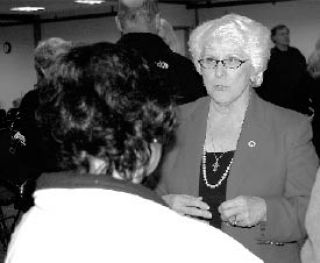The recent state legislative session could easily be described as the three Fs — ferries, freezing weather and flooding.
Those were some of the issues the Legislature tackled during its shortened session it completed recently.
State Sen. Mary Margaret Haugen visited with Oak Harbor residents Wednesday evening at a town hall meeting in the school district administration building.
A small crowd of about 25 people listened as Haugen talked about the legislation that is funding construction of three new ferries that will provide permanent replacements for the Steel Electric vessels, which were pulled from service last November.
“Nothing has been as frustrating as the ferry system,” said Haugen, who is chair of the Senate Transportation Committee, noting that two weeks before the ferries were pulled, Coast Guard and ferry staff told her the antiquated, 80-year-old vessels were in better shape than they thought.
She reiterated plans to build one vessel based on the Steilacoom II now in service at Keystone, followed by two larger vessels.
While some question whether a small Steilacoom II-type vessel should be built, Haugen gave a couple of reasons to move forward.
“Our problem is that it is being leased from Pierce County and they want their boat back,” Haugen said.
She pointed out the vessel could fit in other places in the ferry system once the larger, Island Home vessels are built.
She was questioned by an audience member about replacing the hull on one of the Steel Electric vessels so it could return to service from Port Townsend to Keystone.
The senator replied it would cost the ferry system $1 million to remove the cement from one of the vessel’s hull and another $8 million to fix it.
“You get to the point where you’re spending good money after bad,” Haugen said.
During the 90-minute event, Haugen also touched upon legislation to help repair parts of Washington damaged by last winter’s floods, and she rattled off a list of bills aimed at improving education, health, public safety and veterans’ affairs.
In education, she said there is now more help for students not on track to graduate extra money for school libraries; improved teacher salaries; and the prospect of more skill centers geared toward students not attending four-year colleges.
“I think we come out of Olympia financially well off,” she said, adding that Washington is in better condition financially than other states.



